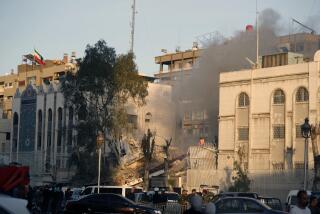Ending the Syrian bloodbath
While other Arab nations take the first steps toward democracy, Syria remains a literal battleground, one on which more than 3,000 people have been killed, according to the United Nations. Unlike his counterparts in Egypt, Libya and Tunisia, President Bashar Assad remains in power. Arab nations that aspire to be peacemakers should press for his departure or at a minimum an end to the violence against the opposition before any negotiations begin.
Assad’s brutal reaction to protests makes him unfit to lead, even in the unlikely event that he meaningfully shared power with the opposition. A small but revealing example of the thuggery of the Assad regime was the harassment of U.S. Ambassador Robert S. Ford. Last month, Ford’s motorcade was attacked, trapping Ford and other U.S. diplomats for about 90 minutes in an office building where he was meeting with an opposition leader. The Obama administration has recalled Ford, ostensibly to “give him a little bit of a break.”
The Syrian National Council, an umbrella organization representing several rebel groups, does not support airstrikes by outside governments like the ones that helped drive Moammar Kadafi from power. Instead it has called for international “monitors” to take up positions inside the country to prevent violence. But unless they were an armed peacekeeping force they would be hard pressed to restrain pro-Assad fighters. In the absence of a definitive victory by rebels or major concessions by Assad, other means must be tried, from sanctions to diplomacy.
On Wednesday, an Arab ministerial committee, led by the prime minister of Qatar, met with Assad. This isn’t the first such initiative. The 22-nation Arab League, which turned against Kadafi by supporting a no-fly zone, has given Syria until the end of the month to establish a cease-fire and start a dialogue with the opposition. Should Syria fail to do so, the league pledged to meet again to consider other options.
Both initiatives assume that Assad is willing to relinquish some of his power. There is nothing in the record to support that view, but perhaps there is no harm in testing him. We will not be surprised if the Arab diplomats conclude, however, that the only solution to the crisis in Syria is his resignation.
Every Arab country is unique, and the experiences of Libya, Tunisia and Egypt are not interchangeable. But there is one striking similarity: All three countries have been ruled by autocrats who suppressed dissent and stifled political development, and all three are now free of their longtime dictators. That would be the best outcome for the Syrian people as well.
More to Read
A cure for the common opinion
Get thought-provoking perspectives with our weekly newsletter.
You may occasionally receive promotional content from the Los Angeles Times.






